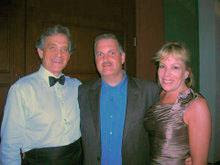CLEARING UP SOME TAX MISCONCEPTIONS
As the end of the year draws near, some really on the ball folks like to get their paperwork in order as the W2’s and 1099’s start to arrive. Below you will find some common myth’s about tax laws that can you in filling out your forms or deciding to make some last minute expenses or deductions to decrease your taxable income.
MYTH: Using the automatic 4-month extension of filing your tax return by April 15 exposes you to a greater risk of being audited.
Wrong. There's no correlation between using the automatic extension and getting audited.
MYTH: Using the preprinted label on your return increases your chances of being audited.
Wrong. The preprinted label is used to speed up return processing. There's no correlation between using the preprinted label and being audited.
MYTH: You can't claim your parents as dependents unless they live with you.
Wrong. Parents need not live with you their children to be claimed as dependents. If other requirements regarding amount of support and amount of parent’s income are satisfied you can claim your parents as dependents even though they do not live with you.
MYTH: Money received as a gift or inheritance is taxable.
Wrong. Not as a general rule. Money or property received as a gift or inheritance is exempt from income tax if the gift is under $13,000. Payment of the gift or estate tax is the responsibility of the donor or the decedent's estate. However, if the gift or estate tax isn't paid the IRS can collect the tax from the donee or heir.
MYTH: Distributions from tax-free funds are always tax-free.
Wrong. In addition to income, tax-free funds sometimes make capital gains distributions. The capital gains distributions are subject to income taxes even though they are distributed by tax-free funds.
MYTH: Canceled checks are always accepted as proof of charitable contributions.
Wrong. A written acknowledgment from the charity is required for all charitable contributions of $250 or more. A canceled check is not considered sufficient substantiation for contributions of $250 or more. Also, new in 2007, charitable donations such as clothing to the goodwill now needs to be itemized if it is over $500.
Please note, I am not a tax advisor or a tax professional. For more information, please check with a professional.
Helping You Find Peace and Prosperity
David Carroll
952-544-0117
www.thehomebusinesscompany.com
Wednesday, December 26, 2007
Saturday, July 21, 2007
Get Out of Debt the Smart Way
Get Out of Debt the Smart Way
No matter how much money we make every year, Americans statistically carry a higher debt to income ratio then 25 years ago. Experts like Suze Orman and others offer simple, everyday solutions to try and manage your debt on a daily, monthly, yearly and long -term basis.
Some basic steps include:
• Pay off high income rate credit cards. If you do not have the cash on hand, try and move the balances over to lower rate or fixed rate card.
• Always pay more than the minimum payment every month. This will help eliminate The endless cycle of just putting money towards the interest and not lowering the principal balance
• NEVER make a late payment. The majority of companies now allow you to make payments online free of charge. You also can set up reoccurring monthly payments so that you know that you will never be late again.
• Monitor your credit scores. The Fair Credit Reporting Act (FCRA) requires each of the nationwide consumer reporting companies to provide you (upon request) to one free credit report every 12 months. These can be obtained online at the following sites:
1. www.transunion.com
2. www.experian.com
3. www.equifax.com
• Be sure to dispute any information on each report that is incorrect, out of date or accounts that do not belong to you
• Try to stay well below your credit limits. In other words, if you have $10,000 of credit available, it is wise to use the 80/20 ratio and keep 80% of your credit available.
• Try to have 3 months income saved in case of emergencies
• Banks such as www.ING.com. Currently are offering interest rates for savings accounts with no minimum balance between 4-6%, well above the national average.
• If you find that you are in over your head look to non-profit companies like www.acc.net to help manage your debt and possibly work with your creditors to lower interest rates and payment and help get you back on track.
• Finally and most importantly, if you can’t pay cash DON’T BUY IT
Helping You Find Peace and Prosperity
David Carroll
952-544-0117
http://www.thehomebusinesscompany.com/
No matter how much money we make every year, Americans statistically carry a higher debt to income ratio then 25 years ago. Experts like Suze Orman and others offer simple, everyday solutions to try and manage your debt on a daily, monthly, yearly and long -term basis.
Some basic steps include:
• Pay off high income rate credit cards. If you do not have the cash on hand, try and move the balances over to lower rate or fixed rate card.
• Always pay more than the minimum payment every month. This will help eliminate The endless cycle of just putting money towards the interest and not lowering the principal balance
• NEVER make a late payment. The majority of companies now allow you to make payments online free of charge. You also can set up reoccurring monthly payments so that you know that you will never be late again.
• Monitor your credit scores. The Fair Credit Reporting Act (FCRA) requires each of the nationwide consumer reporting companies to provide you (upon request) to one free credit report every 12 months. These can be obtained online at the following sites:
1. www.transunion.com
2. www.experian.com
3. www.equifax.com
• Be sure to dispute any information on each report that is incorrect, out of date or accounts that do not belong to you
• Try to stay well below your credit limits. In other words, if you have $10,000 of credit available, it is wise to use the 80/20 ratio and keep 80% of your credit available.
• Try to have 3 months income saved in case of emergencies
• Banks such as www.ING.com. Currently are offering interest rates for savings accounts with no minimum balance between 4-6%, well above the national average.
• If you find that you are in over your head look to non-profit companies like www.acc.net to help manage your debt and possibly work with your creditors to lower interest rates and payment and help get you back on track.
• Finally and most importantly, if you can’t pay cash DON’T BUY IT
Helping You Find Peace and Prosperity
David Carroll
952-544-0117
http://www.thehomebusinesscompany.com/
Subscribe to:
Comments (Atom)


